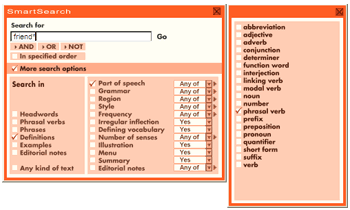|

FROM THE EDITOR
 In
this Issue In
this Issue
 Contributors Contributors
 Letters
to the Editor Letters
to the Editor
 Write
to Us Write
to Us
 Spread
the Word Spread
the Word
 Back
Issues Back
Issues
 Index Index
FEATURE
 Hungarian
or Hunglish? Hungarian
or Hunglish?
Borrowings and false friends
between Hungarian and English
COLUMNS
 Metaphor Metaphor
What we talk about
when we talk about
friendship
 Focus
on Language Focus
on Language
Study:
Introduction
Collocation
Fixed combinations:
idioms and phrasal verbs
UK version ¦
US version
 New
word of the month New
word of the month
The language of the European Union
 Top
Tips for the CD-ROMs Top
Tips for the CD-ROMs
Phrasal verbs practice
using the
CD-ROMs
 onestopenglish.com onestopenglish.com
|
 |
Top
Tips for the CD-ROMs
by Mairi
MacDonald
This month's Language
Study article looks at fixed phrases including phrasal verbs. In this
article we'll take a look at how you can use the CD-ROMs to revise and
practise phrasal verbs with your students.
1 Searching for phrasal verbs
There are two easy ways to find phrasal verbs in the CD-ROM
dictionaries. The following searches were carried out using MED, but you
can adopt the same approach using the Essential CD, although the results
will be slightly different.
You can use WordSearch
to search according to what particle the phrasal verbs contain. Simply
click on the WordSearch button below the search box on the left
hand side. Select Phrasal verbs and leave the other boxes unchecked.
Type in a particle, for example 'in' and click on Go.

In the MED CD-ROM, this returns 182 results, from add
in to zero in on.
You can also search for phrasal verbs formed with a particular
verb. For example, type in take, make sure Phrasal verbs
is checked as before and click on Go. MED CD-ROM will give you
17 search results:
take after, take against, take apart,
take away from,
take back, take down, take in, take off, take on, take out,
take over, take through, take to, take up, take up on,
take up with, take upon
If you want to present
a set of phrasal verbs as part of a theme, you can use SmartSearch
to find phrasal verbs relating to a particular topic. This month's article
on metaphor is on friendship,
so to find phrasal verbs connected with this topic, we want the CD to
pick out phrasal verbs containing the word friend or friendly
in the definition.
To do this, select SmartSearch and type in friend*.
This will look for instances of words beginning with friend, such
as friend, friends, friendly etc.
Click on More search options and check Definitions,
Part of Speech and select phrasal verb.

MED will give you the following results:
buddy up, chum up, cosy up to,
cut off, fall in with, fall out,
get along, get in with, pal up, have in, hold to, keep in with,
knock around, make up, make up to, patch up, play up to,
rag on, rub along, set against, sponge off, take up with,
win over
Here are a few more searches on the subject of love and
friendship:
1 Type in love*, click on More search
options and check Definitions, Part of Speech and select
phrasal verb. The search results will include the following:
care for, cuddle up, dedicate to,
dote on, fall for, fuss over, pine for, slobber over, toy with
2 Type in family, click on More search
options and check Definitions, Part of Speech and select
phrasal verb. This search will give the following phrasal verbs:
call after, come from, marry into,
name after, spring from
|
Tip
If
you get too may results you can narrow down your search by checking
the Style option and selecting categories such as informal
or spoken.
|
2 Creating classroom activities
You will now have plenty of examples of phrasal verbs.
Select some definitions and example sentences that you feel are relevant
for your students. You can copy and paste these from the CD-ROM to create
activities. Here are a couple of approaches you might like to try.
|
Activity
1
Match the definition on the left with the example
sentence on the right. Phrasal verbs are marked in bold.
| to persuade someone who can help
you to be your friend or like you |
a |
Richard and
his sister don't get along. |
| to stop being friendly with someone
because you have had a disagreement with them |
b |
I don't want
you to take up with the wrong crowd. |
| if people ____ _______, they
like each other and are friendly to each other |
c |
Who was that
lad you used to knock around with? |
| to become friendly with someone
again after an argument |
d |
Why did all
his friends suddenly cut him off? |
| to try to become friendly with
someone in order to get some benefit for yourself |
e |
Have you two
fallen out? |
| to stop having a close or friendly
relationship with someone |
f |
He has been
accused of cosying up to the new US president. |
| to spend time with someone because
you are friends |
g |
If you want
to be elected to the club, she's the person you need to get
in with. |
| to become friendly with someone,
especially someone who could have a bad influence on you |
h |
Why don't you
two forget your differences and make up? |
Answers
|
|
Activity
2
Use this activity to practise phrasal verbs students
are already familiar with.
Complete the sentences by choosing the correct particle
from the box below.
1. He really cared _____ her.
2. He cuddled _____ to her on the sofa.
3. Everyone was fussing _____ the new baby.
4. She pined _____ some excitement in her life.
5. She absolutely dotes _____ the grandchildren.
6. Of course, the male students slobber all _____ her.
Answers
|
|
Activity
3
Identify the incorrect sentences. Put in the correct
particle where appropriate.
1. The plane should take up on time.
2. In looks she takes after her father.
3. If you don't like the scarf, I can take
it back.
4. I'm not sure how much of his explanation
she took up.
5. Chris has taken up jogging.
6. We're not taking out any new staff
at the moment.
7. The officer started to take her
notebook off.
8. Can you take on the cooking while
I walk the dog?
9. These files take in a lot of disk
space.
10. I've decided to take you up
on that job offer.
Answers
|
|





